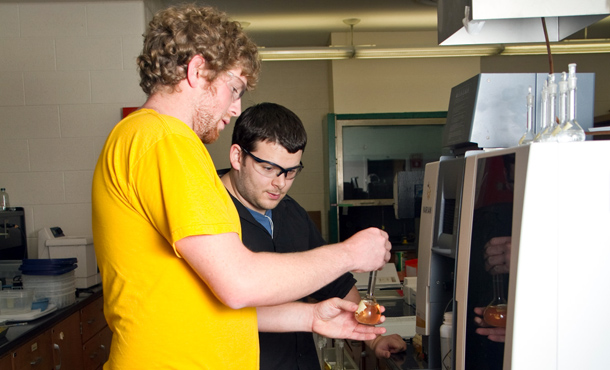A grant from the U.S. Department of Agriculture (USDA) will help feed an organic blueberry revolution in the Shenandoah Valley.
“Sustaining Organic Blueberry Production: Analysis of Practices and Assessing Outcomes,” a research projected directed by Roman Miller, PhD, professor of biology at Eastern Mennonite University (EMU), will look at the merits of organic horticulture as it relates to blueberries.
“[The $26,300 grant] will fund a model system of quantifying sustainable blueberry production as a specialty crop,” said Miller. “In addition, it will provide support for students doing horticulture research, create a model system for area farmers interesting in diversifying their operations and encourage the local community on organic agriculture.”
The EMU team of Miller, chemistry professors Stephen Cessna and Tara Kishbaugh, will be overseeing the project. Participating in the project are EMU student assistants Jonathan Fretz and Travis Riesen, Virginia Cooperative Extension representatives, Eric Bendfeldt and Amber Vallotton and Kevin Damian, president of Virginia Association for Biological Farming.
A system of sustainability
A recent Food Marketing Institute study found a rising demand for organic products, with over 80 percent of grocery stores featuring an organic section as of 2008.
“There continues to be a huge demand for small fruits and vegetables, particularly for blueberries, strawberries and brambles,” said Bendfeldt.
A principal goal of the project is to develop a model system of quantifying sustainable organic blueberry production in the Shenandoah Valley. Research will integrate plant foliar nutrient, growth, and vigor analysis; measurement of photosynthesis; and berry quality and composition to determine quantity and quality of the berries.
“Since there are limited sources of local blueberries in the Valley, the project will fill some of the gap between supply and demand of local and organic produce,” said Kishbaugh. “Additionally, the information at the project website will be an invaluable resource for gardeners and others interested in raising blueberries themselves or about the process of organic farming.”
The information from the project could also motivate farmers to diversify their current agricultural systems, according to Cessna. “Through this project we are hoping to become better informed about best practice for highbush blueberry growers and which soil and plants work best in the Valley,” said Cessna.
Coming to fruition
While the grant officially began on Nov. 1, and will run until Oct. 31, 2013, preparation for the project began several years ago. Miller started in 2008 by setting up an experimental design for growing blueberries at Knoll Acres, an organic farm four miles outside Harrisonburg.
“My initial experimental design was to select a hillside site which is rocky and not tillable for the organic plot,” said Miller. “Four subplots were formed based on the soil amendment treatments: horse manure compost; sheep manure compost; pine needle compost; and a commercial compost, Planters Choice.”
About 180 bushes were planted in December 2009, 160 of which were in organic plots representing five cultivars: Duke, Jersey, Bluegold, Chandler and BlueCrop. Soil conditions and plant growth were monitored and an irrigation system was installed during the 15 months after planting.
“This is a long-term project to demonstrate that a farmer can initiate a small commercial organic blueberry operation that is sustainable and cost effective,” said Miller. “These blueberry bushes will likely be productive for 20 years or more and the grant will support the extended analysis that most horticulturalists do not bother doing because of time, labor and direct expenses involved.”
Impact on the community
The project will be beneficial to local farmers and consumers in Virginia, according to Bendfeldt. “Farmers and consumers are keenly interested in and aware of best agricultural practices, economic and environmental sustainability and the potential health benefits of organic blueberry production,” said Bendfelt.
Bendfelt feels the project will allow students to work in a “living laboratory” and assess the research they gather and the impact it has on development and production differentiation for farmers.
“The proposal builds on the values and ethos of EMU’s efforts to engage their students and the community in sustainable agriculture, environmental stewardship and creation care,” said Bendfelt.

Greetings from Chile:
(Sorry for my bad english).
I’m agronomist that work with blueberries in Ñuble, Bio-Bio Region and I’m very interested in this research. How can I acces to this?.
Good job and lucky.